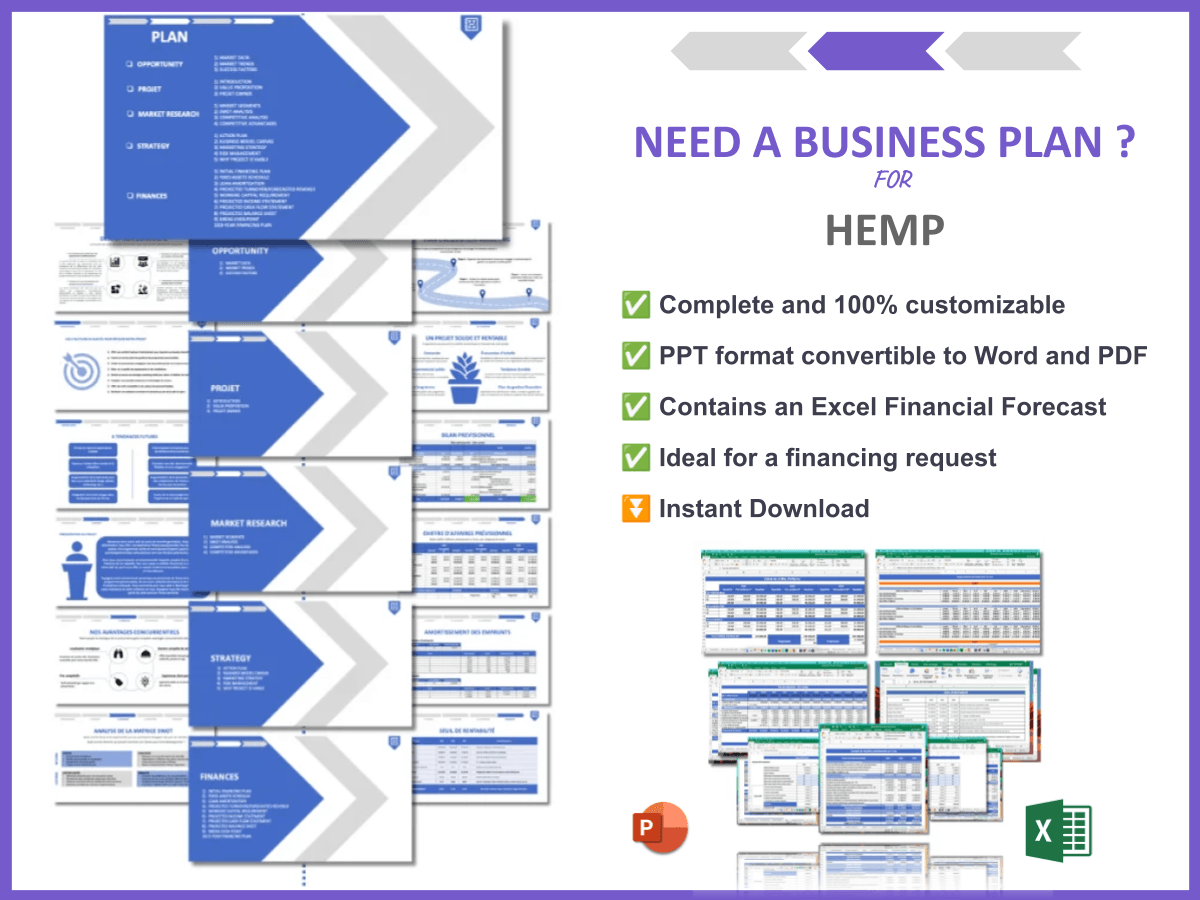Are you curious about how to start a hemp business? You’re not alone! The hemp industry is booming, with many entrepreneurs eager to dive into this versatile and profitable market. Did you know that the global hemp market is projected to reach over $26 billion by 2025? It’s a staggering figure that highlights the incredible potential of this industry. In simple terms, starting a hemp business involves cultivating, processing, or selling hemp products, which can range from CBD oil to textiles. This guide will take you through the essential steps to help you launch your own hemp venture successfully.
- Identify your passion and niche in the hemp industry.
- Conduct thorough market research for your hemp business.
- Choose a memorable name for your hemp business.
- Create a comprehensive business plan for your hemp business.
- Determine the legal structure for your hemp business.
- Secure funding and financial resources for your hemp business.
1. Identify Your Passion and Niche in the Hemp Industry
Before diving into the hemp business, it’s crucial to find your passion. Are you interested in hemp cultivation, product development, or maybe even retail sales? Pinpointing your niche will help guide your journey.
Here are some questions to help you narrow it down:
- What aspects of the hemp industry excite you the most?
- Do you have any existing skills or experiences that can contribute to your business?
- What are your long-term goals for your hemp business?
Consider creating a list of your interests and skills. This self-assessment will be a game-changer when it comes to building a successful hemp business.
Ultimately, your passion will drive your success!
2. Conduct Thorough Market Research for Your Hemp Business
Understanding the market is essential for any entrepreneur, especially in the rapidly evolving hemp industry. Research current trends, consumer preferences, and the competition. This will provide you with valuable insights that can shape your business strategy.
Here’s how to conduct effective market research:
- Online Surveys: Create surveys to gather feedback from potential customers about their preferences and needs.
- Focus Groups: Organize small focus groups to discuss hemp products and gather opinions.
- Competitor Analysis: Research your competitors by examining their offerings, pricing, and marketing strategies.
Utilize tools like Google Trends and social media analytics to track emerging trends in the hemp market. This way, you can tailor your offerings to meet market demands and seize opportunities.
Don’t forget to analyze your competitors. What are they doing right? Where can you stand out? This knowledge will help you carve out your unique space in the market.
3. Choose a Memorable Name for Your Hemp Business
Your business name is your first impression. It should reflect your brand’s values and niche. Aim for something catchy yet professional that resonates with your target audience.
Here are some tips for choosing a great business name:
- Keep It Simple: Choose a name that’s easy to spell and remember.
- Be Descriptive: Your name should give potential customers an idea of what your business does.
- Check Availability: Make sure the name isn’t already in use and check for domain availability.
Consider creating a shortlist and testing it with friends or potential customers. Their feedback can be invaluable!
Once you’ve settled on a name, don’t forget to secure the domain name and social media handles to ensure consistency across platforms. Your name is the face of your business, so make it count!
4. Create a Comprehensive Business Plan for Your Hemp Business
A solid business plan is your roadmap. It outlines your goals, strategies, and financial projections, serving as a guide through the early stages of your business.
Here are the key components of a successful business plan:
| Section | Description |
|---|---|
| Executive Summary | A brief overview of your business idea, mission statement, and the products you plan to offer. |
| Market Analysis | Insights into your target market, including demographics, market trends, and competitive analysis. |
| Marketing Strategy | Details on how you plan to attract and retain customers, including promotional strategies. |
| Financial Projections | Estimates of your revenue, expenses, and profitability for the next few years. |
I recommend checking out this business plan template for Hemp. It’s super detailed and can save you a ton of time!
Don’t skip this step—it’s vital for securing funding and guiding your operations. A well-thought-out business plan not only helps you stay on track but also impresses potential investors and partners.
5. Determine the Legal Structure for Your Hemp Business
Choosing a legal structure is a big decision that can impact your taxes, liability, and business operations. Will you operate as a sole proprietor, LLC, or corporation? Each option has its pros and cons, so weigh them carefully.
Here’s a quick overview of common business structures:
| Business Structure | Pros | Cons |
|---|---|---|
| Sole Proprietorship | Easy to set up; full control of the business. | Personal liability for debts and obligations. |
| Limited Liability Company (LLC) | Limited liability; flexible management structure. | More paperwork and fees than sole proprietorship. |
| Corporation | Limited liability; can raise capital through stock. | Complex structure; more regulations and taxes. |
Consult with a legal expert if you’re unsure which structure is best for your business. Making the right choice can save you headaches down the road, especially when it comes to protecting your personal assets.
6. Secure Funding and Financial Resources for Your Hemp Business
Funding is often a major hurdle for new businesses, and the hemp industry is no exception. Explore various options such as loans, grants, or investors to finance your venture.
Here are some funding sources you might consider:
- Traditional Bank Loans: Good for established businesses with a solid credit history.
- Small Business Administration (SBA) Loans: Government-backed loans with favorable terms.
- Angel Investors: Wealthy individuals who provide capital in exchange for equity.
- Crowdfunding: Platforms like Kickstarter or GoFundMe can help you raise funds from the public.
Prepare a compelling pitch that highlights your business plan and potential for growth. Include your market research findings and financial projections to instill confidence in your potential investors.
Don’t forget to consider creative financing options, such as partnerships with other businesses or leveraging personal savings. The more diverse your funding sources, the better prepared you’ll be to launch your hemp business successfully.
7. Register Your Hemp Business Officially
Once you’ve got everything in place, it’s time to make it official. Registering your business is a crucial step that gives your venture legitimacy and helps establish trust with customers.
Here’s a simple checklist to follow when registering your hemp business:
- Choose Your Business Name: Ensure it’s unique and not already registered in your state.
- Register with State Authorities: Depending on your business structure, this may involve filing articles of incorporation or formation.
- Obtain an Employer Identification Number (EIN): This is necessary for tax purposes and hiring employees.
- Open a Business Bank Account: Keep your personal and business finances separate for better financial management.
Make sure you have all necessary paperwork completed to avoid any legal issues. This step will legitimize your venture and help build trust with customers.
Additionally, keep copies of all registration documents for your records, as you may need them when applying for licenses or permits later on.
8. Obtain Necessary Permits and Licenses for Your Hemp Business
Legal compliance is crucial in the hemp industry. Research the specific licenses and permits required in your state or country to operate legally.
Here are some common permits and licenses you might need:
- Hemp Cultivation License: Required if you plan to grow hemp.
- Processing License: Necessary if you will process hemp into products.
- Retail License: Needed if you plan to sell hemp products directly to consumers.
Staying compliant will save you from costly fines and potential shutdowns. It’s essential to keep up with local regulations, as they can change frequently.
Consider consulting with a legal expert who specializes in the hemp industry to ensure you’re fully compliant with all laws. Keep a checklist of all required documents to ensure you’re fully covered.
By taking the time to understand and fulfill these legal requirements, you’ll set a solid foundation for your hemp business and pave the way for long-term success.
9. Set Up Your Financial Management Systems for Your Hemp Business
Proper financial management is key to the success of your hemp business. You need to track expenses, revenue, and profits effectively to make informed decisions.
Here are some essential steps to set up your financial management system:
- Choose Accounting Software: Select a user-friendly software that fits your business needs, like QuickBooks or FreshBooks.
- Open a Business Bank Account: This helps separate personal and business finances, making accounting easier.
- Hire an Accountant: If numbers aren’t your strong suit, consider hiring a professional to help manage your finances.
Additionally, keep organized records of all transactions. This will not only help during tax season but also provide clarity on your business’s financial health.
Here’s a simple table to illustrate the types of financial documents you should maintain:
| Document Type | Purpose |
|---|---|
| Income Statements | Shows your revenue and expenses over a specific period. |
| Balance Sheets | Provides a snapshot of your assets, liabilities, and equity at a given time. |
| Cash Flow Statements | Tracks the flow of cash in and out of your business. |
Maintaining these documents will give you insights into your business performance and help you make strategic decisions moving forward.
10. Establish Your Unique Brand Identity for Your Hemp Business
Your brand is more than just a logo; it’s your business’s personality. Developing a strong brand identity that resonates with your target audience is crucial for standing out in the competitive hemp industry.
Here are some key elements to consider when establishing your brand identity:
- Brand Values: Define what your business stands for and the values you want to communicate.
- Visual Identity: Choose color schemes, fonts, and imagery that align with your brand message.
- Brand Voice: Determine the tone and style of your communication, whether it’s professional, casual, or playful.
To help clarify your brand identity, consider answering the following questions:
- What makes your hemp products unique?
- Who is your target audience?
- What emotions do you want your brand to evoke?
Once you’ve established your brand identity, ensure consistency across all platforms—your website, social media, and marketing materials. This consistency will strengthen your brand’s recognition and help build trust with your customers.
Remember, your brand is the face of your hemp business, so invest time and resources in creating a compelling identity that reflects your mission and resonates with your audience.
11. Develop a Professional Website for Your Hemp Business
In today’s digital age, a professional website is a must for any hemp business. It serves as your online storefront and should be user-friendly, informative, and visually appealing.
Here are some essential elements to include on your website:
- Homepage: A clear introduction to your brand and what you offer.
- Product Pages: Detailed descriptions and high-quality images of your hemp products.
- About Us: Share your story, mission, and values to connect with your audience.
- Contact Information: Make it easy for customers to reach you with a dedicated contact page.
Additionally, optimize your website for search engines to improve visibility. This includes using relevant keywords, such as hemp products and hemp cultivation, in your content.
Here’s a simple checklist for creating an effective website:
- Choose a reliable web hosting service.
- Select a clean, professional design template.
- Ensure your website is mobile-friendly.
- Incorporate strong calls to action (CTAs) to encourage purchases or inquiries.
Remember, your website is often the first interaction potential customers have with your brand. Make it count!
12. Create Effective Marketing Strategies for Your Hemp Business
Marketing is crucial for growth, especially in the competitive hemp industry. Utilizing a mix of online and offline strategies can help you reach a broader audience.
Here are some effective marketing strategies to consider:
- Social Media Marketing: Use platforms like Instagram and Facebook to showcase your products and engage with customers.
- Email Marketing: Build a mailing list to share updates, promotions, and valuable content related to hemp.
- Content Marketing: Create informative blog posts, videos, or infographics that educate your audience about hemp.
Additionally, consider hosting events or participating in trade shows to build brand awareness. Networking with other businesses and potential customers can lead to valuable partnerships and increased visibility.
Here’s a simple table to illustrate some marketing channels and their benefits:
| Marketing Channel | Benefits |
|---|---|
| Social Media | Engagement with audience; visual storytelling. |
| Direct communication; personalized offers. | |
| Content | Establish authority; improve SEO. |
Experiment with different strategies to see what resonates with your audience. The key is to stay adaptable and responsive to market changes.
13. Assemble Your Team for Your Hemp Business
As your business grows, you may need to hire staff to help manage operations. Building a strong team is essential for success in the hemp industry.
Here are some tips for assembling your team:
- Define Roles: Clearly outline the roles and responsibilities needed for your business.
- Look for Passion: Hire individuals who share your passion for hemp and understand the industry.
- Foster a Positive Culture: Create an inclusive and supportive work environment that encourages collaboration.
Consider offering training programs to help your team stay updated on industry trends and regulations. Investing in your team is investing in your business’s future!
Additionally, encourage open communication and feedback to ensure everyone is aligned with your business goals. A motivated and well-informed team can make a significant difference in your hemp business’s success.
By following these steps, you’ll be well on your way to establishing a thriving hemp business that stands out in the market. Good luck on your journey, and don’t forget to enjoy the ride!
Conclusion
Starting a hemp business can be incredibly rewarding, but it requires careful planning and execution. By following the steps outlined in this guide—from identifying your niche to assembling your team—you’ll be well-equipped to launch your venture successfully.
Remember, the key is to stay passionate and adaptable as you navigate the challenges of the hemp industry. As you continue your journey, consider diving deeper into specific areas by checking out our articles on how to create a SWOT Analysis for Hemp and how to launch a Hemp Marketing Plan with examples. These resources can provide valuable insights to further enhance your business strategy.
Good luck on your journey, and don’t forget to enjoy the ride!
FAQ
- What are the legal requirements to start a hemp business?
Legal requirements vary by state and country, but generally include obtaining a hemp cultivation license, processing permits, and ensuring compliance with local regulations. - How much capital do I need to start a hemp business?
The amount of capital required depends on your business model. Starting a hemp farm may require more initial investment compared to launching a hemp retail store. - What products can I sell in the hemp industry?
You can sell a variety of products, including CBD oil, hemp textiles, health supplements, and even food products like hemp seeds and protein powder. - How do I market my hemp products?
Effective marketing strategies include using social media, email marketing, content creation, and participating in trade shows to build brand awareness and connect with customers. - What are the challenges of starting a hemp business?
Challenges may include navigating complex regulations, securing funding, and standing out in a competitive market. Understanding the hemp industry landscape can help mitigate these challenges. - Can I grow hemp for personal use?
In some regions, individuals can grow hemp for personal use, but it’s essential to check local laws and regulations regarding personal cultivation. - How do I find suppliers for my hemp business?
Research online directories, attend industry trade shows, and network with other professionals in the hemp industry to find reliable suppliers. - Is it necessary to have a business plan for a hemp business?
Yes, a business plan is crucial as it outlines your goals, strategies, and financial projections, helping you stay focused and secure funding. - What are the best practices for growing hemp?
Best practices include selecting the right strain, maintaining soil health, adhering to local regulations, and implementing sustainable farming techniques. - How can I ensure quality control in my hemp products?
Implement strict quality control measures, including regular testing of your products for potency and contaminants, to ensure compliance and customer satisfaction.







